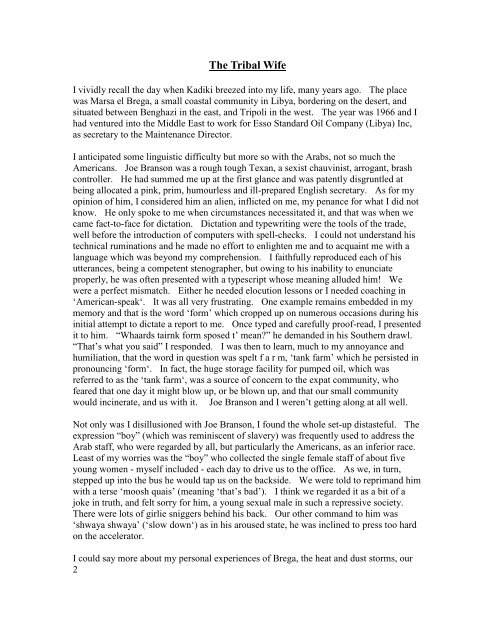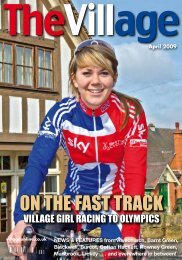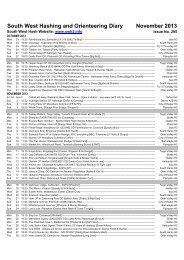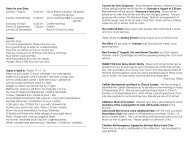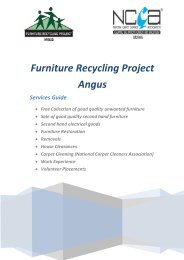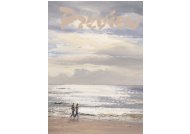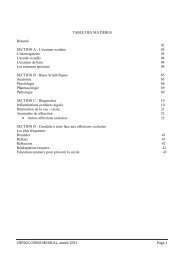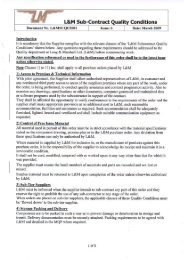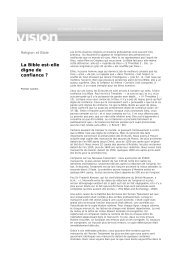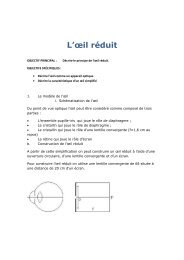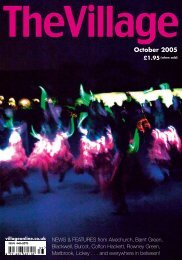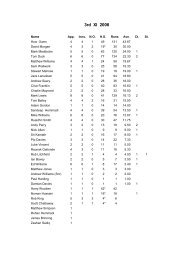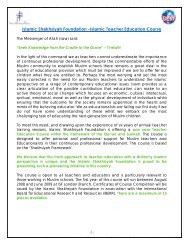The Tribal Wife
The Tribal Wife
The Tribal Wife
You also want an ePaper? Increase the reach of your titles
YUMPU automatically turns print PDFs into web optimized ePapers that Google loves.
<strong>The</strong> <strong>Tribal</strong> <strong>Wife</strong><br />
I vividly recall the day when Kadiki breezed into my life, many years ago. <strong>The</strong> place<br />
was Marsa el Brega, a small coastal community in Libya, bordering on the desert, and<br />
situated between Benghazi in the east, and Tripoli in the west. <strong>The</strong> year was 1966 and I<br />
had ventured into the Middle East to work for Esso Standard Oil Company (Libya) Inc,<br />
as secretary to the Maintenance Director.<br />
I anticipated some linguistic difficulty but more so with the Arabs, not so much the<br />
Americans. Joe Branson was a rough tough Texan, a sexist chauvinist, arrogant, brash<br />
controller. He had summed me up at the first glance and was patently disgruntled at<br />
being allocated a pink, prim, humourless and ill-prepared English secretary. As for my<br />
opinion of him, I considered him an alien, inflicted on me, my penance for what I did not<br />
know. He only spoke to me when circumstances necessitated it, and that was when we<br />
came fact-to-face for dictation. Dictation and typewriting were the tools of the trade,<br />
well before the introduction of computers with spell-checks. I could not understand his<br />
technical ruminations and he made no effort to enlighten me and to acquaint me with a<br />
language which was beyond my comprehension. I faithfully reproduced each of his<br />
utterances, being a competent stenographer, but owing to his inability to enunciate<br />
properly, he was often presented with a typescript whose meaning alluded him! We<br />
were a perfect mismatch. Either he needed elocution lessons or I needed coaching in<br />
‘American-speak‘. It was all very frustrating. One example remains embedded in my<br />
memory and that is the word ‘form’ which cropped up on numerous occasions during his<br />
initial attempt to dictate a report to me. Once typed and carefully proof-read, I presented<br />
it to him. “Whaards tairnk form sposed t’ mean?” he demanded in his Southern drawl.<br />
“That’s what you said” I responded. I was then to learn, much to my annoyance and<br />
humiliation, that the word in question was spelt f a r m, ‘tank farm’ which he persisted in<br />
pronouncing ‘form‘. In fact, the huge storage facility for pumped oil, which was<br />
referred to as the ‘tank farm‘, was a source of concern to the expat community, who<br />
feared that one day it might blow up, or be blown up, and that our small community<br />
would incinerate, and us with it. Joe Branson and I weren’t getting along at all well.<br />
Not only was I disillusioned with Joe Branson, I found the whole set-up distasteful. <strong>The</strong><br />
expression “boy” (which was reminiscent of slavery) was frequently used to address the<br />
Arab staff, who were regarded by all, but particularly the Americans, as an inferior race.<br />
Least of my worries was the “boy” who collected the single female staff of about five<br />
young women - myself included - each day to drive us to the office. As we, in turn,<br />
stepped up into the bus he would tap us on the backside. We were told to reprimand him<br />
with a terse ‘moosh quais’ (meaning ‘that’s bad’). I think we regarded it as a bit of a<br />
joke in truth, and felt sorry for him, a young sexual male in such a repressive society.<br />
<strong>The</strong>re were lots of girlie sniggers behind his back. Our other command to him was<br />
‘shwaya shwaya’ (‘slow down‘) as in his aroused state, he was inclined to press too hard<br />
on the accelerator.<br />
I could say more about my personal experiences of Brega, the heat and dust storms, our<br />
2
villas and the boys who cleaned them, each with his sexual fantasies no doubt. For a<br />
brief time I had a Canadian boyfriend in Brega, who repeated an overheard comment<br />
from an American as I stepped off the light aircraft which flew me to Brega: “that’s sex<br />
personified”. It was a steamy place to be, rumours flying, whispers, back-biting. My<br />
Canadian friend departed for a period of leave back home, air-freighting me an enormous<br />
box of flowers, a most rare sight and commodity in dust-blown, arid Brega. Now I’ll<br />
revert to my mention of Kadiki.<br />
I was in the canteen one day feeling conspicuous and uneasy, when suddenly a vision<br />
appeared before me, the most handsome man I had set eyes upon in my twenty-five years<br />
on this earth. “Do you mind if I join you?” he said, beaming at me, and speaking with a<br />
strong American accent. Needless to say, I didn’t object! He had beautiful features,<br />
classic Greek I would say, with dark brown thick wavy hair (rather like Elvis Presley)<br />
olive skin, shiny, sparkling dark eyes that crinkled at the edges as his smile illuminated<br />
his face and enlivened his striking features, generous lips, beautiful teeth. A God sent<br />
from heaven! He was of athletic build, with narrow hips, broad shoulders, and muscles<br />
of which any sportsman would have been proud. He was a fit and handsome specimen<br />
of manhood and I was shocked to think that he had turned his attention to me, since being<br />
somewhat taciturn and shy, I had never considered myself attractive to men.<br />
Kadiki asked if he could take me driving after work. This is a popular evening activity in<br />
the Middle East, since everyone retires in the heat of the afternoon, and then emerges in<br />
the evening, to shop or meet friends at coffee shops (the men that is), to drive with<br />
windows down, savouring the cool air, or to sit outside enjoying the comparative chill of<br />
the evening, to listen to the screeching cicadas and the croaking bull-frogs (not in barren<br />
Brega of course). So we took our drive, chatted and our friendship and courtship<br />
began.<br />
Mixed-race friendships were frowned upon in Brega which was essentially an American<br />
community with the majority of the workforce being oil-men of Southern origin, where<br />
racial prejudice flourished even in the 1960s. Whispers circulated, advice poured in.<br />
Suddenly I found I had closer affiliations with the Libyans. Kadiki’s friends were very<br />
polite, courteous and considerate and apart from Norma, another secretary with whom I<br />
shared my villa, I had no other friends.<br />
Kadiki was always bright, cheerful, caring, an intriguing mixture of East and West. He<br />
was born in Benghazi, worked for American oil companies in Libya, and had just<br />
returned from two years in Texas as a student of English (American English that it). He<br />
was an exciting person to be with and I trusted him implicitly. Our friendship<br />
blossomed. We met every day, morning, lunch-time, evening. In our spare moments<br />
we were together. He talked of getting engaged, and took me to meet his family, who<br />
although not able to speak English, were very warm, generous and welcoming. His<br />
father, Hazh Juma, a devout Moslem and supporter of King Idris and the status quo, gave<br />
me a beautiful horse as an engagement present.
3<br />
When life in Brega became distasteful and upsetting and I knew I had to leave, Kadiki’s<br />
response was to suggest we plan our departure, leave together for Benghazi, and get<br />
married. I felt very secure and safe with him and acquiesced, willingly. It was six<br />
weeks since our first meeting. I only wanted to be with him and the future looked bright,<br />
and exciting.<br />
Just before we left Brega, Kadiki’s friends, which must have been every Libyan on site,<br />
organised a celebratory party for us. Needless to say, these were all men. <strong>The</strong> only<br />
women invited were Norma and the Personnel Officer, a mature American lady whose<br />
name I cannot recall. <strong>The</strong> men played their ethnic instruments, sang, and danced to<br />
entertain us as we sat like a king and queen with her two hand-maidens. At the end of<br />
the evening they formed a line and each one shook our hand, and wished us well as they<br />
passed, to which I could only reply ‘shookron zarzuela’ (‘thank you very much‘. <strong>The</strong>y<br />
each handed Kadiki a cash gift and this totalled over £800. I should say that the house<br />
we purchased in England in 1967/8 was just over £3,000 so this was indeed a generous<br />
gift, and very moving.<br />
It was August 1966 and Kadiki was arranging our marriage. We were living with his<br />
father, stepmother and large extended family in the Benina district of Benghazi which<br />
was located on the way to the airport, well out of town. I would describe their home as<br />
ethnic and organic, built with blocks of natural stone with some wattle and daub, a little<br />
crude thatch, compressed mud floors with rooms opening onto a courtyard, where<br />
chickens and cats prowled and dozed in the sun. <strong>The</strong> high walls and enclosed living<br />
spaces were typical of Moslem habitat, where covered women endured a furtive,<br />
unchanging existence, where men provided an income - in Hazh Juma’s case by meagre<br />
farming - where men shopped, where men could venture out freely, meet their friends,<br />
spend time in town, were accountable to no-one, but where women covered when visitors<br />
called, or whenever they stepped outside of the walled compound which was home.<br />
Hair was covered by a scarf, which was pulled around the head and knotted at the<br />
forehead, layers of baggy trousers topped with baggy dress, waist-coat and long barakan<br />
(similar to the sari) which was tied on the shoulder and wrapped around the body, secured<br />
with something like a long scarf, which was wound around the hips. <strong>The</strong> lose fabric<br />
would hang down at the back, and could be used for carrying a baby or could be pulled<br />
over head or head and face, when in the presence of any man other than a very close<br />
relative.<br />
<strong>The</strong>re was no piped water. Water was fetched from a nearby well by the children.<br />
Animals were slaughtered for meat - chickens, lamb and goats - and eggs were used in<br />
profusion. Staple foods were rice, pasta and cous cous, with fresh ingredients from the<br />
local ethnic shops or market - tomatoes, coriander, potatoes, chickpeas, yam. Olive oil<br />
and tomato puree, plus sugar and other basic ingredients, were imported from Italy,<br />
mainly. Green tea and mint came from the Far East. Women spent all day preparing<br />
ingredients and cooking. In cleaned animal skins they rocked milk across their legs<br />
4
whilst seated as always, on the floor, to churn butter and create buttermilk. All meals<br />
were savoury. Assida, a kind of large soft dumpling, was served with melted butter and<br />
a sprinkling of sugar, and this was a favourite of mine. Everyone took a turn at scraping<br />
a mouth-sized piece and dipping it into the butter, using their fingers, of course. “Cool<br />
ya‘Awraida” they would say - ‘eat’. Awraida was their chosen name for me, meaning<br />
Rose, as they thought I looked pink like a rose. CousCous granules were made by hand<br />
using flour and maize, and stood in the sun to dry. Animals for slaughter were gripped<br />
between the legs and sacrificed to Allah before the sharp blade severed the neck artery,<br />
causing immediate loss of blood and thankfully, loss of consciousness. Everything was<br />
thoroughly cleaned by groups of women, who hung the entrails out to dry in the sun and<br />
prepared a feast using the flesh, which was cooked on the bone. This was done for Eid<br />
at the end of Ramadan, or on special occasions. <strong>The</strong>y did not always use meat and<br />
nothing was wasted.<br />
Beds were sheepskin rugs on the floor, with several people to each room. Children were<br />
not put to bed but fell asleep in their own time and were placed comfortably and covered<br />
when their time came. Cooking and the ritual tea-making were done on a charcoal fire<br />
in a metal container in the room set aside for cooking, but for the tea-making ceremony,<br />
the cooking pot was placed in the living room. Firstly a small glass of bitter black tea was<br />
served, followed by a sweet and very minty light green tea. It was very Japanese in<br />
character, with everyone sitting around cross-legged on the floor talking, watching and<br />
awaiting their turn to drink. Men were served first, but I was the exception and it never<br />
failed to surprise me. <strong>The</strong>re was little or no furniture, but instead, a large colourful rug<br />
with flat cushions around the edge. Everyone removed their shoes upon entering the<br />
room, which faced out onto the courtyard.<br />
<strong>The</strong> first night I spent with the Kadiki tribe - parents, grand-parents, great-grand-parents,<br />
a multitude of children, aunts, uncles, cousins, I asked Kadiki “where is the toilet?”<br />
“<strong>The</strong>re isn’t one” he said, beaming another of his sunny smiles. “Robha will show you”<br />
at which his step-mother ushered me out and to an enclosure, carrying a torch. <strong>The</strong> cows<br />
and animals huffed and puffed nearby in the dark and still of the night. I couldn’t ask<br />
her how human waste was dealt with but I presume it shrivels in the heat of the day and<br />
gets covered with the red sand which blows on the wind or falls from the shovel. It was<br />
a veritable moonscape, the whole area. Nothing to see beyond the habitation, other than<br />
enormous boulders, rocks and red sand. Kadiki told me they owned all of the land in<br />
this area and the chief elder and tribal leader was Sheik Omar, Hazh Juma’s cousin.<br />
Kadiki’s only surviving sibling was his brother Hamid, who was younger than him, had<br />
married a cousin, Kenus (meaning ‘Treasure‘) and had two young children, Idris and<br />
Saleh. His closest cousin was Busaif, who was frequently with us.<br />
To return to the marriage, it was simple, just a formality. I never wanted a carnival,<br />
just to be married to this special person in my life. As is customary, Kadiki and his<br />
friends went to town to sort out the paperwork. I was driven there and prompted to take<br />
my oath<br />
5
on first converting to Islam - a requirement - and then swearing to cover up, pray as<br />
necessary and be obedient!<br />
Dressed in my Libyan robes I sat speechless while women and children I didn’t know,<br />
came to offer their congratulations. “Mobrouk” (’congratulations‘) they all repeated, the<br />
women giving out a high-pitched shrill sound created by warbling with their tongue<br />
moving rapidly and horizontally in an open mouth. A celebratory cry. Kadiki was<br />
elsewhere, being congratulated by male friends and relatives. I didn’t much care for this<br />
business of separating us all the time. Not only did I need him and miss him, I couldn’t<br />
speak to anyone, other than to keep saying “shookron”.<br />
I found my new family very welcoming. I observed them with intrigue, admiration and<br />
respect. <strong>The</strong>y were not aspiring or acquisitive. <strong>The</strong>y were happy and content with their<br />
traditions, and simple pleasures, and were tolerant of hardship. <strong>The</strong>y were close and<br />
showed respect for each other, they were a dignified people and always most generous.<br />
<strong>The</strong>y had none of life’s luxuries, no electricity or electrical gadgets, they didn’t know<br />
change - changes of fashion, or any of our Western cravings. <strong>The</strong> Koran dictated their<br />
lifestyle and they all pulled in the same direction.<br />
Three years down the line, Kadiki and I had two children, Omar and Yasmina. <strong>The</strong><br />
Revolution was over and Colonel Gadaffi was in power. We were living in a villa in the<br />
Belloun Farm area on the outskirts of Benghazi. We had a live-in Egyptian couple, a<br />
lovely lady called Saadia and her husband Kamal. He did the garden and rode Omar to<br />
school on the cross-bar of his bike. Saardia cleaned and cooked. By now I had acquired<br />
a modicum of linguistic ability. She told me how she was married at 13 and circumcised<br />
by her husband, as was customary. <strong>The</strong>re was so much blood she thought she would die.<br />
She had two daughters who lived with family in Cairo. She asked me how it felt to be a<br />
sexual woman. I pretended I didn’t understand the question.<br />
I braved the dust storms, became accustomed to feeding the multitudes, without notice, as<br />
and when they called - always from communal bowls on the floor, one for the men in one<br />
room, one for the women and children in another room. I hated the habit of hiding<br />
myself when visitors came, of being in a place other than with Kadiki. Tensions grew.<br />
I dreamed of home.<br />
Copyright Brenda Fraser-Newstead


